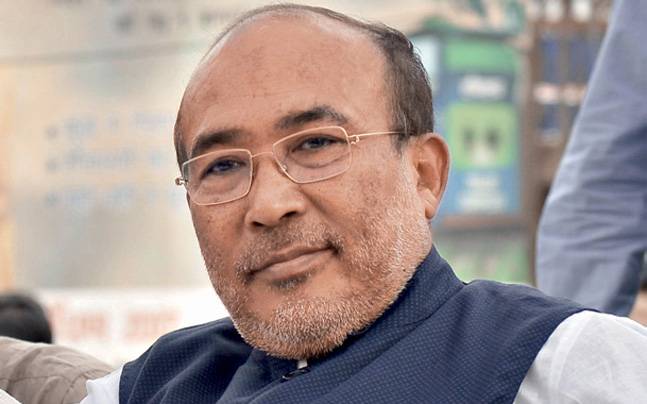Manipur Chief Minister Nongthombam Biren Singh tells India Today in an interview that time has come to review AFSPA.

Fifty-six-year-old Manipur Chief Minister Nongthombam Biren Singh has traded several professions-footabller, BSF soldier, journalist and politician. Even in politics, he has switched sides twice, from Democratic Revolutionary Peoples Party to Congress and finally to BJP. On June 22, the man of many hats completed 100 days running one of the most disturbed states of the country. Understandably, he admits that insurgency is biggest obstacle to development in Manipur but he does not believe the draconian AFSPA is the way forward to bring peace to the state. In an exclusive interview with Kaushik Deka, the chief minister spells out achievements of 100 days and future roadmap.
Q. What are the three big achievements of your government in the first 100 days?
A. Within a week of BJP government coming to power, the 150-day long economic blockade was lifted in the state. The bodies of eight tribal activists, killed in September 2015 violence in Churachandpur, and kept in the mortuary for over 600 days, were buried within two months of my taking charge. Several Central government schemes such as Ujwala have been implemented while free medicines and examination facilities have been provided to BPL families for 57 diseases. Earlier people could not drive even their small cars on the 220-km-long Jiribam-Imphal road. Now you can find hundreds of cars. The state government is going to have another three-four battalions of IRB, which will be used for protection of highways.
A. It is indeed the biggest hurdle. I have reviewed the surrender and rehabilitation policy. Those who are returning to mainstream leaving the violent path must be settled and protected. Their families have to be protected. If we don’t do that, they will start indulging in crimes again or do drugs and join extortion racket. So my Cabinet has submitted a revised surrender plan and now the proposal is with the Union home ministry. If that policy is introduced, insurgency will come down in the state. We will create self-sufficient housing society for surrendered militants and their families. Such societies will have schools, hospitals and banks within their boundaries. I’m also planning to have dialogue with the civil society groups. Political dialogue is the only way out.
Q. What is your formula to create jobs in the state and enhance development?
A. The government will not be able to provide government jobs to all. But we have started skill development and vocational educational system so that we can provide suitable jobs for skilled people.
Q. What is your vision to bridge the divide between the Meiteis in the plain and Nagas and Kukis in the hills?
A. The main problem was the mistrust among these communities. People have seen my efforts. Earlier government machinery was never allowed in Naga-dominated Ukrul. I not only went there but also requested people to help me organize the first state-level Shirui Lily festival, which commemorates the significance of Manipur’s state flower Shirui Lily. The idea was to promote peace and harmony among different communities of the state. The people happily agreed and enthusiastically took part in it. Thousands of valley people were there and they all enjoyed the festival together. I went to Kuki-dominated Churachandpur. I was felicitated in the Barak Spring Festival in Senapati. My approach is to recognize and respect every community and then only we all can live together.
Q. The Union government’s peace deal with the NSCN may have impact on the geography of Manipur. How are you going to deal with that?
A. I will never support compromise of Manipur’s territorial integrity in any talk, whether it’s with NSCN or with Kuki groups.
Q. What’s your view on AFPSA? Do you think Manipur still needs it?
A. Time has come to review the AFPSA.
Q. There have been several allegations of human rights violations by the armed forces and local police? Will your government ensure speedy investigations into those allegations?
A. We will do an unbiased investigation to find out the culprits and then will take adequate action.
Q. The Union government’s recent directive on cattle markets has created a stir across the country. Of course the directive doesn’t stop consumption of beef, but it will certainly have economic impact on dairy farmers, as this will create logistical hurdles. How are you dealing with this situation?
A. Beef is hardly produced for commercial purpose in North-east. It’s mostly used for individual consumption. The Central government directive will not impact individual consumption.
Q. You were a journalist and a sportsperson. How did it help in your evolution as a politician?
A. I learnt team spirit while playing football. I learnt how to take decision in a fraction of a second. When I was a journalist, I investigated and wrote about the loopholes of the government. But I could not change anything about them. Even after joining politics and becoming an MLA, I was always restless because I had so limited opportunities to bring about the change. I had my own approach and plan to work for the people and bring development to the state. But I was not in a position to apply my own mind. But in last three months, people have seen my wisdom and my vision for development and nation building. Now I can do what I want to do.
Q. You were once the most trusted aide of Congress Chief Minister Ibobi Singh. How do you see the difference in the functioning of the two parties?
A. The difference is in the pace of taking quick and bold decisions. Government duty is to prevent untoward incidents. Earlier government was not pro-active. Actions followed after something happened. Now I have the opportunity to change that.



